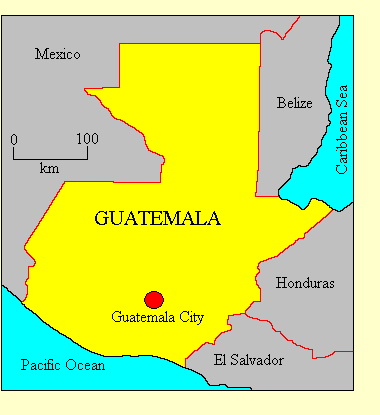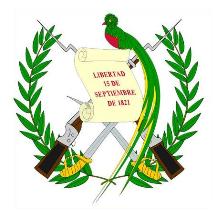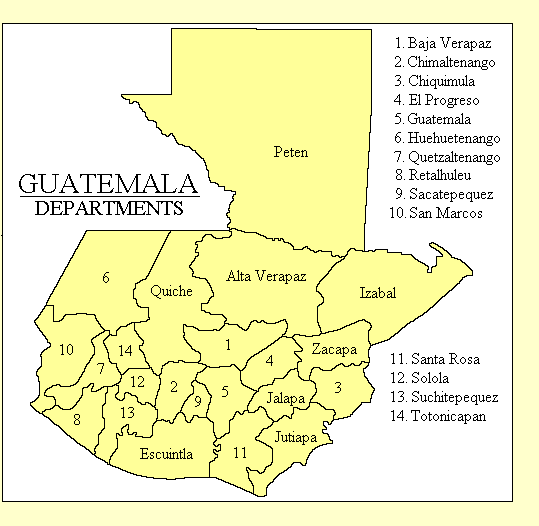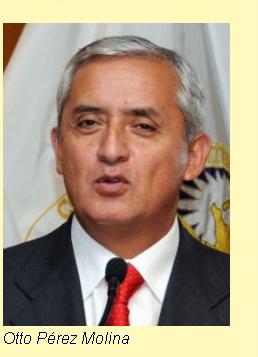

REPUBLIC OF GUATEMALA
• Official name: Republica de Guatemala (Republic of Guatemala)
• Location: Central America
• International organisations: Non-Aligned Movement, Organisation of American States, United Nations,
World Trade Organisation
• Borders: Belize, El Salvador, Honduras, Mexico
• Coastline: Caribbean Sea, North Pacific Ocean
• Land area: 108,890 Km2
• Population: 13,300,000
• Annual GDP (PPP) per capita: US$5,200 (2009 CIA estimate). World ranking: 113
• Ethnicity: More than half the population are classed as mestizo or Ladino (mixed Amerindian-Spanish), while nearly all the remainder
are of wholly Amerindian descent.
• Languages: Spanish is the official language, and is the first language of 60% of the population. The remainder speak Amerindian
languages such as Quiche or Cakchiquel.
• Religion: The great majority of the population are Catholic Christians.
• Form of government: Presidential democratic republic. Guatemala is divided into 22 departments.
• Capital: Guatemala City (Ciudad de Guatemala)
• Constitution: The Constitution of the Republic of Guatemala
came into effect on 31 May 1985.
• Head of state: The President, elected by direct universal suffrage for a four-year term.
• Head of government: The President, who appoints all ministers.

• Legislature: Guatemala has a unicameral legislature, the Congress of the Republic (Congreso
de la Republica), which has 113 members elected for four-year terms, 91 elected from multi-member constituencies corresponding to the
departements, and 22 elected by proportional representation.
• Electoral authority: The Supreme Electoral Tribunal administers national elections.
• Freedom House 2009 rating: Political Rights 3, Civil Liberties 4
Political history
The territory which is now Guatemala was brought under Spanish rule in the 1520s. Guatemala City was founded in 1776.
When the Spanish withdrew in the 1820s, Guatemala briefly became part of Mexico, and then belonged to the United Provinces of Central
America until the federation broke up in 1840. The Republic of Guatemala was established in 1847.
For most of its history Guatemala has been ruled by a small landowning elite. Attempts by liberal leaders, such as Justo Rufino
Barrios in the 1870s, to modernise the country were usually unsuccessful. In the 20th century the country was dominated by American
corporations such as the United Fruit Company, which controlled Guatemala's vital banana export industry: Guatemala was the
original "banana republic."
In 1944 a group of liberal military officers seized power and inaugurated a programme of land reform under successive presidents Juan
Jose Arevalo and Jacobo Arbenz. Arbenz permitted the communist Guatemalan Labor Party to gain legal status and some influence in the
government. In 1954 Arbenz was overthrown by a coup backed by the United States and the United Fruit Company.
The return to military rule sparked left-wing guerilla resistance, which in turn led to military repression and violent
vigilantism by right-wing groups. A state of civil war existed through most of the 1970s and '80s, culminating in the presidency of
Efraim Rios Montt, an extreme right-winger. In the late 1980s there was a gradual return to civilian government.

President Jorge Serrano, elected in 1990, attempted to make himself a dictator in 1993, but for the first time the army
defended constitutional government. The end of the cold war allowed a peace settlement to be negotiated, culminating in a treaty under
United Nations auspices in 1996, which ended the civil war and established a monitoring process for elections and human rights.
Alfonso Portillo of the very conservative Guatemalan Republican Front (FRG) was
elected President in 1999. In 2003 the FRG candidate, the former dictator Efrain Rios Montt for President, was defeated by
Oscar Berger of the more moderate Grand National Alliance (GANA). Alvaro Colom of the liberal
National Unity of Hope (UNE) was elected President in 2007. The UNE also won the largest number number
of seats at the 2007 legislative election, followed by the GANA and the Patriotic Party. At the
2011 presidential election, the right regained power when the Patriotic Party's
Otto Perez Molina was
elected president.
Freedom House's 2009 report on Guatemala
says: "Guatemala is an electoral democracy. Though the campaign period was marred by intimidation and violence, the 2007 presidential
and legislative elections were regarded by international observers as generally free and fair... ... Efforts to promote transparency
and combat corruption have made some progress... Guatemala was ranked 96 out of 180 countries surveyed in Transparency International's
2008 Corruption Perceptions Index... While freedom of speech is protected by the constitution, those who stridently condemn the government
or past human rights abuses can face persecution... Freedom of assembly is guaranteed and generally respected in practice. However,
police often use force to break up demonstrations... The judiciary is plagued by corruption, inefficiency, capacity shortages, and
violent intimidation of judges, prosecutors, and witnesses."
Updated January 2012
|


